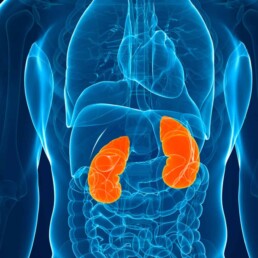As we delve deep into countless medical journals to uncover the latest on Integrative Medicine’s approach to kidney health, we are always reminded of the value of your time. Our commitment remains steadfast in curating and succinctly summarizing these vital studies for you. Welcome to the September Research and News.
Proton Pump Inhibitor Use Linked to Increased Fracture Risk in Patients with Chronic Kidney Disease
A population-based observational case-control study was conducted to investigate the association between proton pump inhibitor (PPI) use and the risk of bone fractures among patients with chronic kidney disease (CKD).
Data from 12,152 patients (6,076 with fractures and 6,076 without) were analyzed using the IQVIATM Disease Analyzer database.
Multivariable logistic regression adjusted for confounding factors revealed that PPI use significantly increased the risk of fractures (odds ratio [OR] 1.68; 95% CI 1.55–1.83), particularly notable in individuals under 60 who had used PPIs for more than two years (OR 6.85; 95% CI 1.85–25.38) or those with a cumulative PPI dose above 16,000 mg (OR 4.62; 95% CI 1.87–11.44). The risk was similar between men and women.
Why is this Important?
The findings underscore the need for cautious prescription of PPIs in CKD patients, particularly among younger individuals or those with prolonged usage, as these patients already face a heightened risk of fractures.
Deprescribing PPIs in patients without a clear medical indication may significantly reduce the fracture risk in this vulnerable group, potentially decreasing morbidity and mortality associated with bone fractures in CKD patients.
This study highlights the importance of evaluating medication risks and benefits in managing CKD complications.
Dietary Fiber Intake and Its Impact on Mortality and Clinical Outcomes in Chronic Kidney Disease Patients
The study explored the association between dietary fiber intake and clinical outcomes among 3,791 participants with chronic kidney disease (CKD) from the Chronic Renal Insufficiency Cohort study.
Dietary fiber intake was assessed and participants were categorized into tertiles. Using Cox Proportional Hazards models adjusted for various factors including inflammatory markers, it was found that lower dietary fiber intake correlated with a slightly higher risk of all-cause mortality, with participants in the middle and low tertiles having a 19% and 11% greater risk of death, respectively, compared to the highest fiber intake group.
However, there were no significant associations between dietary fiber intake and adverse cardiovascular or kidney outcomes, nor were there significant associations with levels of C-reactive protein and interleukin-6.
Why is this important?
Understanding the impact of dietary fiber on CKD patients is crucial as dietary interventions are common for chronic disease management.
While the study showed a potential link between low fiber intake and increased all-cause mortality, no significant effects were observed on cardiovascular or kidney outcomes.
These findings suggest that while dietary fiber might influence survival rates, it does not appear to affect disease progression directly in CKD.
Further randomized trials are necessary to confirm these findings and potentially guide dietary recommendations for improving long-term outcomes in CKD patients.
Dietary Acid Reduction with Fruits and Vegetables Versus Sodium Bicarbonate: Impact on Kidney and Cardiovascular Health in Hypertensive Patients
This five-year, interventional, randomized control trial investigated the effects of dietary acid reduction on kidney disease progression and cardiovascular health in 153 hypertensive patients with macroalbuminuria.
Participants were assigned to receive either fruits and vegetables, oral sodium bicarbonate (NaHCO3), or continue with Usual Care.
The study found that chronic kidney disease progression was significantly slower in the fruits and vegetables or NaHCO3 groups compared to Usual Care.
Additionally, those consuming fruits and vegetables experienced greater improvements in systolic blood pressure and cardiovascular risk indices, despite lower doses of pharmacologic treatments.
Why is this important?
The study highlights the potential of non-pharmacologic interventions, specifically dietary adjustments like increased intake of fruits and vegetables, in managing hypertension and reducing the risk of chronic kidney disease and cardiovascular complications.
This emphasizes the role of diet in complementing traditional pharmacologic treatments, providing a more holistic approach to disease management in hypertensive patients.
Join us to end the kidney disease epidemic
Impact of Gestational Exposure to Systemic Glucocorticoids on Childhood Chronic Kidney Disease Risk
This retrospective cohort study, conducted in Taiwan’s largest healthcare system, explored the association between gestational exposure to maternal systemic glucocorticoids and the development of chronic kidney disease (CKD) in children.
Analyzing 23,363 singleton births from 2004 to 2018, researchers utilized Cox proportional hazards models to determine risks.
Results revealed a significant association between prenatal glucocorticoid exposure and increased CKD risk in children (Adjusted Hazard Ratio, AHR, 1.69).
Notably, risks were amplified in specific subgroups, including preterm births, males, second-trimester exposures, and higher cumulative glucocorticoid dosages.
Why is this important?
Understanding the potential long-term renal risks associated with prenatal glucocorticoid exposure could influence obstetric care and postnatal monitoring, particularly in developing strategies to mitigate CKD risks in children exposed to these medications in utero.
This study highlights the need for careful consideration and potential regulation of glucocorticoid use during pregnancy to prevent adverse kidney outcomes in offspring.
Review article of the month
Cancer Drugs and Acute Kidney Injury
Cancer therapies, including traditional chemotherapies, innovative immunotherapies, and targeted treatments, have significantly improved survival rates but also pose risks of acute kidney injury (AKI).
Conventional chemotherapies like cisplatin and methotrexate are known for causing tubulointerstitial injuries, while newer immunotherapies such as immune checkpoint inhibitors and CAR-T therapies often lead to kidney immune-related adverse events, including acute interstitial nephritis and occasionally glomerular disease.
Additionally, recent targeted therapies have been linked to ‘pseudo-AKI’ by affecting renal tubular secretion of creatinine, creating misleading serum creatinine elevations, though some cases show true kidney damage.
This review discusses all these details.
You can download the full PDF here.
Join here to receive FREE monthly updates on the latest research in Integrative Nephrology and tips on managing kidney disease straight to your inbox.
We would love to hear your feedback. Let us know what you think of these educational materials and if you like us to focus on specific topics. Please email us at info@inkidney.com.







